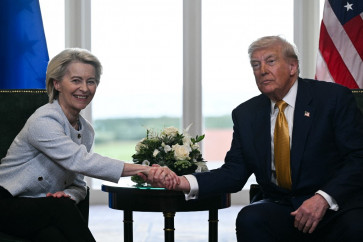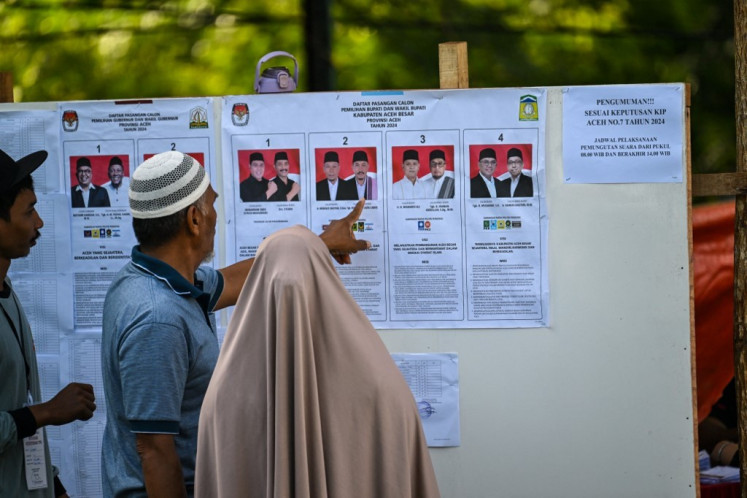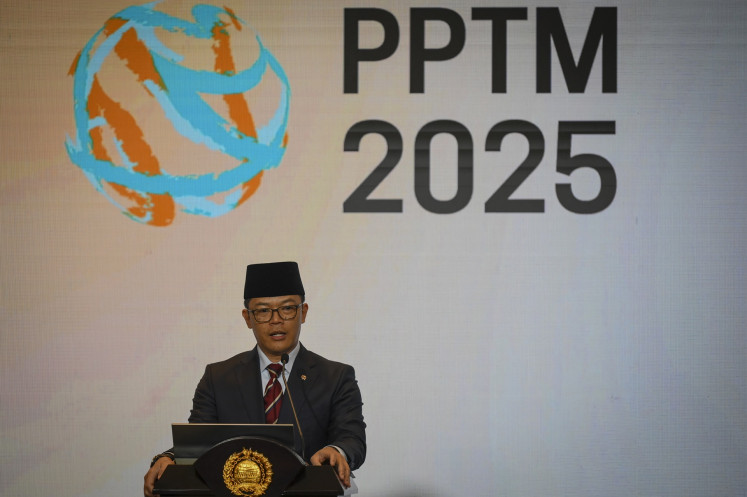Popular Reads
Top Results
Can't find what you're looking for?
View all search resultsPopular Reads
Top Results
Can't find what you're looking for?
View all search resultsFew choices for the sexually exploited
Gloomy: Two sex workers sit at a cigarette stall in Cipinang, East Jakarta
Change text size
Gift Premium Articles
to Anyone
G
span class="caption" style="width: 398px;">Gloomy: Two sex workers sit at a cigarette stall in Cipinang, East Jakarta. ECPAT Indonesia (End Child Prostitution, Pornography and Trafficking for Sexual Purposes) recently released a report on the situation of CSEC (Commercial Sexual Exploitation of Children) in Indonesia, and the verdict is not promising for the world’s third largest democracy. JP/Wendra AjistyatamaFina (not her real name) is just like any ordinary 16-year-old girl you walk past on the street on any given day in Jakarta.
She loves Justin Bieber, hanging out and shopping with her friends, reading books and singing karaoke.
There exists, however, one thing that sets Fina apart from other girls her age. After she fi nishes singing karaoke for the night, instead of returning home to her family, she goes home with a man selected by a karaoke club in North Jakarta and sleeps with him for money to support herself and her sister.
She speaks of her situation with a disturbing calmness, answering questions pertaining to her sex life as if you just asked her what she ate for breakfast, and she refl ects on her decision to enter the industry as if it was a well thought out logical decision that anyone in her position would have come to the same way.
She grew up in a home with mental and physical abuse, was forced to stop going to school when she was only 9 due to social and economic reasons and moved away with her sister to start a new life.
It was then that they realized any prospects for economic stability were washed away because of their situation, so both of them became prostitutes.
After her recent marriage, Fina’s older sister quit the industry at the request of her new husband, so the younger sister was faced with a decision most of us would fi nd unimaginable: Continue working to support her sister and her new child, or face economic turmoil with no possibility of an income. Fina chose the former.
Unfortunately, her story is not at all uncommon in Indonesia. ECPAT Indonesia (End Child Prostitution, Pornography and Traffi cking for Sexual Purposes) recently released their 2011 international report on the situation of CSEC (Commercial Sexual Exploitation of Children) in Indonesia, and the verdict is not promising for the world’s third largest democracy.
The report, released on Oct. 18 in Jakarta, assesses the fi ve major aspects of combating CSES in the country: 1) Coordination and Cooperation 2) Prevention 3) Protection 4) Recovery, Rehabilitation and Reintegration and 5) Child Participation, as well as outlining future strategies for NGOs and the government to take in the future to combat sexual exploitation.
According to the report, there are 40,000 – 70,000 victims of child sexual exploitation in Indonesia, with 21,000 instances occurring on the island of Java alone.
NGOs like ECPAT are eager to vent their frustration in attempting to deal with the issues; they struggle with limited resources, uncooperative authorities and a legal-system that fails to protect what they say are the country’s most vulnerable citizens, children. All this, accompanied by what they claim are fruitless “all talk no action” policymaking by the government make this an uphill battle.
“Laws in this country are a mess, as well as the mentality of law enforcement offi cers,” Sofi an Ahmad, National Coordinator for ECPAT Indonesia, said, adding that tourists, spas, hotels and amusement centers tend to turn a blind eye to the devastation they are causing these children for their own personal benefi t.
The Indonesian government is one of a handful of countries that have not yet ratifi ed the 2000 Optional Protocol to the Convention on the Rights of a Child on the sale of children, child prostitution and child pornography, a stance that is refl ected in laws at a national level where there are currently no legal measures preventing adults from purchasing sex from a minor.
Children who enter the sex industry tend to already be stuck in a position of extreme vulnerability, in greatest need of society’s support.
Unemployed, uneducated, young and facing a dim outlook for the future, the “choice” is generally taken from a position of desperation, thus beginning a vicious cycle taking society’s least fortunate and placing them in the hands of men chasing their sexual desires.
No way out: Several sex workers wait for customers in Cipinang, East Jakarta. JP/Wendra AjistyatamaSofian acknowledges that a lack of resources may contribute to the hindrance of any efforts made by the government, but insists that this refl ects the need to extend to the international community for help by means of training, expert exchanges and internships to other countries determined to combat the disease.
Fina dreams of being an actress one day, like her role model Julie Estelle, but also admits that this may seem distant due to her lack of education and unwarranted stigma attached to girls like her, yet she remains motivated to continue to work toward her dreams in an effort to provide her and her family with the same opportunities that many others come about much easier.
She is thankful for the support given to her by NGOs such as Bandung Wangi, where she is given access to medical testing and emotional support, and she can now admit that she is on the verge of seeing an escape route from her current lifestyle.
Her story is, however, far from over, and the tens of thousands of other children faced with her situation spread throughout the archipelago may not be as lucky if they are unfortunate enough to fall through the cracks of the already weakened system.
The complexity of the matter makes it incredibly diffi cult to resolve by any ordinary means; deeply seeded roots in morality and economic and social equality only add weight to the already overwhelming problem.
But those working closest to the issue agree that as long as customers are able to demand the availability of young children in the industry, without fear of prosecution, this problem will only get worse before it gets better, and, tragically, more girls like Fina will be there to meet the demand.











